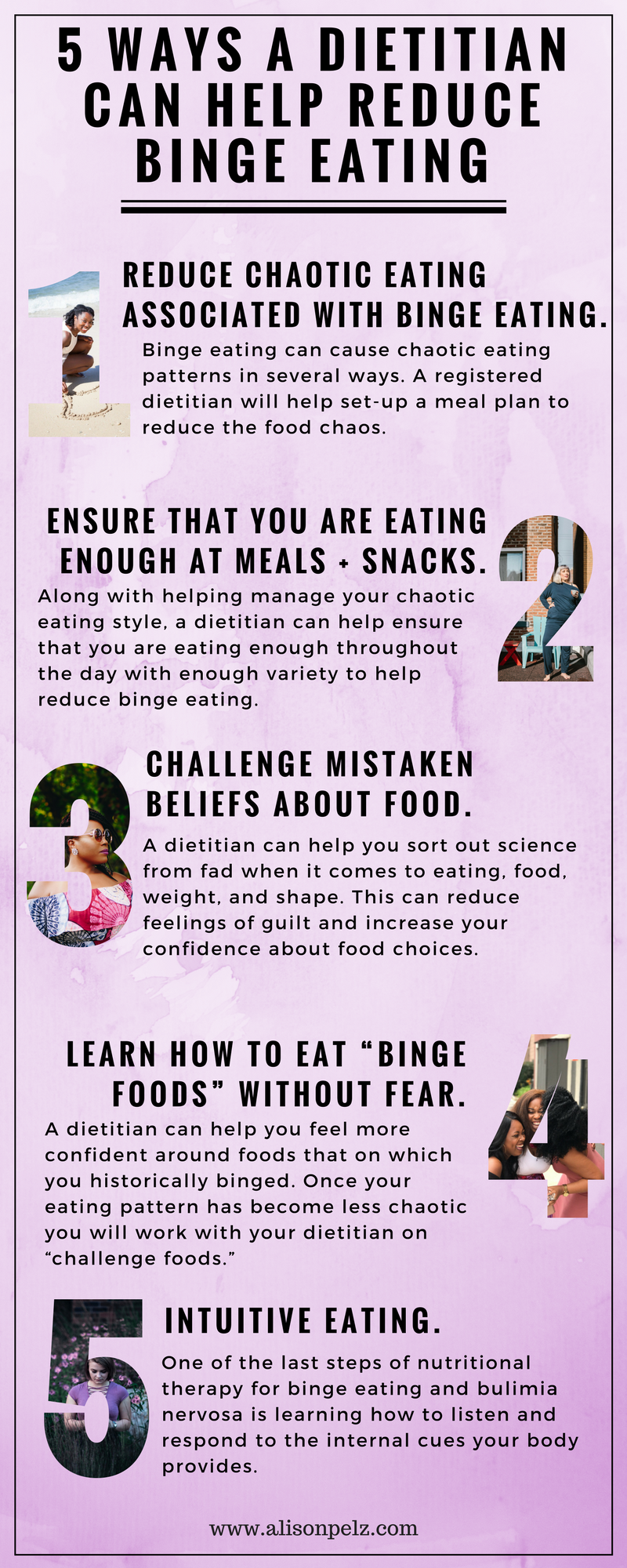Whether you are struggling with binge eating disorder or bulimia nervosa, a dietitian who specializes in eating disorders on your treatment team is a must.
If you have an eating disorder, you probably already know a lot about food. You probably know how many calories, how much fat and how many sugar grams are in different foods. You probably are an expert on the latest diets. You may be asking yourself, “Why do I need to see a dietitian for my recovery if I already know so much about food?”.
Remember, eating disorders are not really about food. Food and eating disorder behaviors are used to cope with stress, relationship struggles, worry, and other uncomfortable feelings.
Therefore, knowledge about food is not the issue, but rather how you relate to food.
5 ways that a dietitian can help in binge eating disorder and bulimia nervosa recovery:
1. Reduce chaotic eating associated with binge eating.
Binge eating can cause chaotic eating patterns in several ways. After a binge, you may find yourself not wanting to eat for several hours or skip the next meal. This turns into a nasty cycle because skipping meals can then lead to more binge eating. If you tend to binge (or binge-purge) at a certain time of the day, let’s say in the evening, then you may tend to restrict food during the day in order to “make-up” for binge eating later on in the evening. Again, restricting calories can exacerbate the binge eating. A registered dietitian will help set-up a meal plan to reduce the food chaos.
2. Ensure that you are eating enough at meals and snacks.
Studies show that food restriction leads to binge eating. Our bodies want to ensure that we get enough food. If we chronically underfeed it at certain times of the day then when we have access to food, we will eat more than we made need at that moment. Along with helping manage your chaotic eating style, a dietitian can help ensure that you are eating enough throughout the day with enough variety to help reduce binge eating.
3. Challenge mistaken beliefs about food.
A dietitian can help you sort out science from fad when it comes to eating, food, weight, and shape. There are a million messages about food on TV and social media and from well-meaning friends, family members, and co-workers. On any given day, it seems like the messages about which foods are “good” and which foods are “bad” to eat are moving targets. During the 90s, fat was the culprit. Now gluten and carbohydrates have a bullet on their head. Not only do we get messages about which foods to eat, but also how to eat them—eat these foods; not these foods; eat 6 small meals a day; don’t eat in between meals. You get the point. There are so many messages out there, it’s no wonder America is plagued with eating problems.
Challenging mistaken beliefs about food can reduce feelings of guilt and increase your confidence about food choices, which ultimately help reduce binge eating and the binge-purge cycle.
4. Learn how to eat “binge foods” without fear.
A dietitian can help you feel more confident around foods that on which historically binged. Once your eating pattern has become less chaotic and you are feeding yourself more regularly throughout the day with foods you enjoy, you will work with your dietitian on “challenge foods.” Challenge foods are foods that you avoid (due to fear of binge or binge-purge), foods that you regularly binge on, and/or foods that cause a lot of anxiety before or after eating them.
A dietitian can work with you several ways to do this, such as doing an in-the-office food challenge (yep, eating your challenge food during the appointment) and practicing eating the foods with others.
5. Intuitive eating.
One of the last steps of nutritional therapy for binge eating and bulimia nervosa is learning how to listen and respond to the internal cues your body provides. In other words, you will learn how to trust your body, not some diet, when it comes to feeding yourself.
Note: Consulting with a registered dietitian who has experience treating eating disorders is a must. While a registered dietitian is one member of the treatment team, a medical doctor, counselor, and a psychiatrist are also needed.



